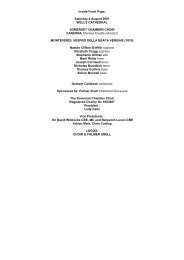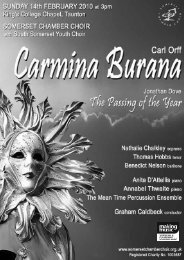Click here to view the concert programme - Somerset Chamber Choir
Click here to view the concert programme - Somerset Chamber Choir
Click here to view the concert programme - Somerset Chamber Choir
Create successful ePaper yourself
Turn your PDF publications into a flip-book with our unique Google optimized e-Paper software.
The Cloud-capp’d TowersThe cloud-capp’d <strong>to</strong>wers, <strong>the</strong> gorgeous palaces,The solemn temples, <strong>the</strong> great globe itself,Shall dissolve, and like this insubstantial pageant faded,Leave not a rack behind:We are such stuff as dreams are made on,And our little life is rounded with a sleep.The Tempest Act IV Scene 1BrittenThe Ballad of Little Musgrave and Lady BarnardOver Hill, Over DaleOver hill, over dale,Thorough bush, thorough briar,Over park, over pale,Thorough flood, thorough fire,I do wander everyw<strong>here</strong>,Swifter than <strong>the</strong> moonés sp<strong>here</strong>;And I serve <strong>the</strong> fairy queen,To dew her orbs upon <strong>the</strong> green.The cowslips tall her pensioners be;In <strong>the</strong>ir gold coat spots you see;Those be rubies, fairy favours,In those freckles live <strong>the</strong>ir savours.I must go seek some dewdrops <strong>here</strong>,And hang a pearl in every cowslip’s ear.A Midsummer Night’s Dream Act II Scene 1During 1943, <strong>the</strong> year in which he composed his cantata Rejoice in <strong>the</strong> Lamb, Britten had also given various wartimerecitals and in <strong>the</strong> autumn received a commission <strong>to</strong> write a piece for men’s voices and piano. With a dedication <strong>to</strong>‘Richard Wood and <strong>the</strong> musicians of Oflag VIIb’ (a prisoner-of-war camp in Bavaria) The Ballad of Little Musgrave andLady Barnard is an anonymous tale of adultery, betrayal and regret that would have had immediate appeal <strong>to</strong> <strong>the</strong>incarcerated officers. Over an initial <strong>to</strong>lling bell accompaniment it tells of <strong>the</strong> seduction of Lady Barnard by Musgraveafter Mattins w<strong>here</strong> ‘he had more mind of <strong>the</strong> fair women than he had of our Lady’s Grace!’ When word reaches LordBarnard by means of an eavesdropping page this is graphically portrayed in a galloping 6/8 complete with warning horncalls as he runs alongside his master’s coach. A duel ensues ending with <strong>the</strong> death of both lovers. This little masterpiecedemonstrates Britten’s superb ability <strong>to</strong> match words with high quality music at <strong>the</strong> appropriate skill level for amateurperformers without any loss of artistry. Its first performance <strong>to</strong>ok place in February 1944 during part of a month-longcamp music festival with Lieutenant Richard Wood conducting about thirty men accompanied by Barrie Grayson andFred Henson on two pianos. (After <strong>the</strong> war, Barrie Grayson became Head of Music at St Peter’s College, Saltley inBimingham and was a colleague of Wallace Caldbeck, Graham Caldbeck’s fa<strong>the</strong>r, who was Head of Handicraft at <strong>the</strong>same college.) The UK première of The Ballad of Little Musgrave and Lady Barnard was given at London’s Wigmore Hallin 1951.As it fell on one holy-day,As many be in <strong>the</strong> year,When young men and maids <strong>to</strong>ge<strong>the</strong>r did goTheir matins and mass <strong>to</strong> hear,Little Musgrave came <strong>to</strong> <strong>the</strong> church-door -The priest was at private mass -But he had more mind of <strong>the</strong> fair womenThen he had of Our Lady's grace.The one of <strong>the</strong>m was clad in green,Ano<strong>the</strong>r was clad in pall,And <strong>the</strong>n came in my Lord Barnard's wife,The fairest amongst <strong>the</strong>m all.Quoth she, 'I have loved <strong>the</strong>e, Little Musgrave,Full long and many a day.' -'So have I loved you, fair ladye,Yet never word durst I say.' -'But I have a bower at Bucklesfordberry,Full daintily it is dight;If thou'lt wend thi<strong>the</strong>r, thou Little Musgrave,Thou's lie in my arms all night.'With that beheard a little tiny page,By his lady's coach as he ran.Says, 'Although I am my lady's foot-page,Yet I am Lord Barnard's man.'Then he's cast off his hose and shoon,Set down his feet and ran,And w<strong>here</strong> <strong>the</strong> bridges were broken downHe bent his bow and swam.'Awake! awake! thou Lord Barnard,As thou art a man of life!Little Musgrave is at BucklesfordberryAlong with thy own wedded wife.' -He callèd up his merry men all:'Come saddle me my steed;This night must I <strong>to</strong> Bucklesfordberry,For I never had greater need.'But some <strong>the</strong>y whistled, and some <strong>the</strong>y sung,And some <strong>the</strong>y thus could say,Whenever Lord Barnard's horn it blew:'Away, Musgrave, away! ... -'Methinks I hear <strong>the</strong> threstle cock,Methinks I hear <strong>the</strong> jay;Methinks I hear Lord Barnard's horn,Away, Musgrave, away!' -'Lie still, lie still, thou little Musgrave,And huggle me from <strong>the</strong> cold;'Tis nothing but a shepherd's boyA-driving his sheep <strong>to</strong> <strong>the</strong> fold.'- 13 -












